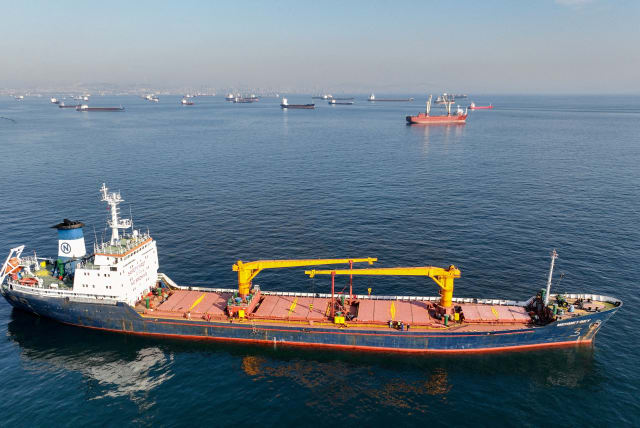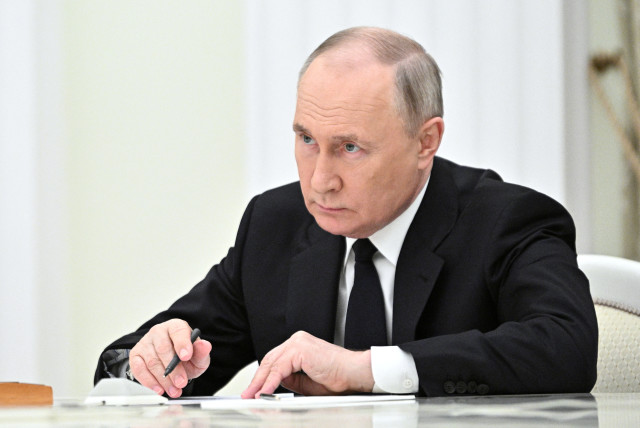Navigating China's trade corridors and Israel's strategic choices - opinion

Three key trade routes from China - Northern, Southern, and Middle Corridors - reshape geopolitics. Israel leans towards the Middle Corridor for strategic trade security amidst escalating tensions.
The shifting sands of the geopolitical landscape accentuate the strategic prominence of three principal trade corridors emanating from China: the Northern Corridor traversing Russia, the Southern Corridor via Iran, and the Middle Corridor cutting through Azerbaijan and Kazakhstan.
In the context of escalating regional tensions, notably concerning Iran and the ongoing conflict in Ukraine, Israel’s strategic calculus may increasingly favor the augmentation of the Middle Corridor.
Known as the Trans-Caspian International Transport Route (TITR), the Middle Corridor emerges as a burgeoning conduit linking China with Europe via the heartlands of Central Asia and the Caucasus. This route threads through Kazakhstan, skips across the Caspian Sea, wends through Azerbaijan and Georgia, and finally unfurls into Eastern Europe.
It heralds a direct and efficient alternative, circumventing the geopolitical quagmires associated with traversing Russia to the north and navigating through less stable southern terrains. As this corridor ascends in significance, it is lauded for providing a swifter, safer, and more reliable bridge between the colossal markets of Asia and Europe, leveraging Central Asia's strategic geographical and economic positioning.
The dominion Russia exercises over the Northern Corridor is a paradoxical blessing. While it presents a stable passage amidst regional turmoil, Moscow’s engagement in the Ukrainian conflict underscores its potential to manipulate critical infrastructures for geopolitical ends.
This capability to sway global trade dynamics bestows formidable power upon Russia, mirroring Iran’s sway over crucial maritime conduits in the Southern Corridor. Both powers have demonstrated their capacity to virtually hold the global economy to ransom, threatening or actualizing disruptions in these vital channels, whether they pertain to energy supplies or broader trade routes.
Russian influence in central Asia
The southern trajectory weaves through territories under Russian influence and Iran - a route distinctly misaligned with Israel’s strategic interests. Uzbekistan and Kyrgyzstan, Central Asian nations, fall significantly under Russia’s sway, particularly regarding their transport and economic infrastructures. This influence pervades the major rail and road corridors that stitch these countries into the broader tapestry of routes connecting China to Europe.
These arteries, vital for the transit of goods, remain under Russian dominion, either directly or through layers of economic and political leverage. In 2023, the rail freight volume pulsing between China and Europe burgeoned to a notable 674,000 TEU (twenty-foot equivalent units), underscoring the sheer volume and the critical economic stakes of these routes.
The dependency on pathways meandering through Russian-controlled areas injects a vein of strategic vulnerability; geopolitical frictions involving Russia could precipitate disruptions in these essential supply chains, throttling the robust flow of commerce between Europe and Asia.
The Southern Corridor unfurls as an alternate vein for merchandise flowing from China to Europe, coursing through Iran. This passage grants Tehran potential choke points to disrupt these supply lines or to siphon revenue through transit fees. Such maneuvers would augment Tehran’s coffers and amplify its geopolitical clout by commandeering another crucial commercial artery.
Iran’s strategies to dominate energy conduits through the Yemeni waters are already well-charted, with aspirations to broaden its influence over additional pivotal supply chains.For Israel, Iran’s grip over a crucial segment of the global trade network is especially disconcerting. It poses a palpable threat to the stability of international commerce and escalates regional tensions, standing in stark opposition to Israeli interests that champion secure and seamless global trade flows.
Endorsing the Northern Corridor, which depends considerably on Russian goodwill, might seem a less perilous option for Israel compared to the latent threats from a hostile Iran, yet it is far from ideal. This choice may be partly swayed by the burgeoning partnerships and observed stability along the Middle Corridor through Azerbaijan and Kazakhstan, offering a more secure alternative that diminishes reliance on any pathway monopolized by potential foes.
The alliance between Israel and Kazakhstan exemplifies a paradigm of sustained, high-level cooperation and mutual respect that has flourished over several decades. Formalized soon after Kazakhstan declared its independence in 1991, this relationship has been fortified through a succession of state visits and strategic accords.
A landmark in these evolving ties was Israeli Prime Minister Benjamin Netanyahu’s visit to Astana in December 2016, which highlighted the broad cooperation spanning security, technology, and agriculture. This visit also provided a platform to articulate Israel’s perspectives on significant geopolitical issues and bolster connections with a pivotal Central Asian nation.
Additionally, both countries consistently participate in dialogues across various international forums, with Kazakhstan adopting a balanced and constructive stance on Middle Eastern affairs, advocating peaceful resolutions to regional conflicts. These interactions do not merely cement bilateral relationships; they also advance broader regional and international stability.
Kazakhstan’s recent diplomatic maneuvers suggest a nuanced shift away from Russian dominion, indicative of a gradual cooling in relations with Moscow. This pivot includes an expanded outreach towards Western nations. This development harbors significant implications for countries like Israel, which are in pursuit of stable and reliable trade routes free from the overbearing influence of geopolitically conflicted states.
Despite Kazakhstan’s affiliations with the Collective Security Treaty Organization (CSTO), which remains under Russian influence, its burgeoning relations with Western powers enhance the viability of the Middle Corridor as a secure trade conduit for Israel. This strategic alignment safeguards Israel’s economic ventures and bolsters its geopolitical stature by fostering ties with nations increasingly oriented towards the West.
Simultaneously, Israel and Azerbaijan’s strategic partnership, particularly robust within the realms of defense and energy, has seen considerable deepening. The recent inauguration of Azerbaijan’s embassy in Tel Aviv is a testament to this. This gesture reciprocates Israel’s established diplomatic presence in Baku and heralds a new chapter of overt diplomatic engagements between the two states.
Their alliance is further cemented by significant defense collaborations, with Azerbaijan procuring advanced military hardware from Israel, including sophisticated air defense systems. This military alliance proved crucial during Azerbaijan’s conflict over Nagorno-Karabakh, underscoring the strategic depth of their partnership.
Additionally, Israel’s substantial oil imports from Azerbaijan considerably enhance its energy security. President Ilham Aliyev's support for Azerbaijan’s Jewish community, exemplified through initiatives like synagogue and cultural center constructions, underscores shared values of diversity and tolerance, further enriching the bilateral relationship.
Israel stands to gain immensely from the Middle Corridor, which traverses Azerbaijan and Kazakhstan - nations geopolitically amicable and aligned with Israeli interests. This route holds strategic importance as it does not fortify any direct adversaries, thus mitigating the risk of tensions and conflicts that could disrupt supply chains.
Contrasting with the Northern and Southern Corridors, which fall under the sway of Russia and Iran, respectively, the Middle Corridor offers a more secure alternative, skirting potential geopolitical hot spots. This delineation of trade paths underscores a critical recalibration of Israel’s strategic engagements, ensuring that its commerce and political alliances remain resilient against the backdrop of a dynamically evolving global stage.
Catherine Perez Shakdam is the executive director, and Dr. Stepan Stepanenko is the director of research at the Forum for Foreign Relations.
Jerusalem Post Store
`; document.getElementById("linkPremium").innerHTML = cont; var divWithLink = document.getElementById("premium-link"); if (divWithLink !== null && divWithLink !== 'undefined') { divWithLink.style.border = "solid 1px #cb0f3e"; divWithLink.style.textAlign = "center"; divWithLink.style.marginBottom = "15px"; divWithLink.style.marginTop = "15px"; divWithLink.style.width = "100%"; divWithLink.style.backgroundColor = "#122952"; divWithLink.style.color = "#ffffff"; divWithLink.style.lineHeight = "1.5"; } } (function (v, i) { });

